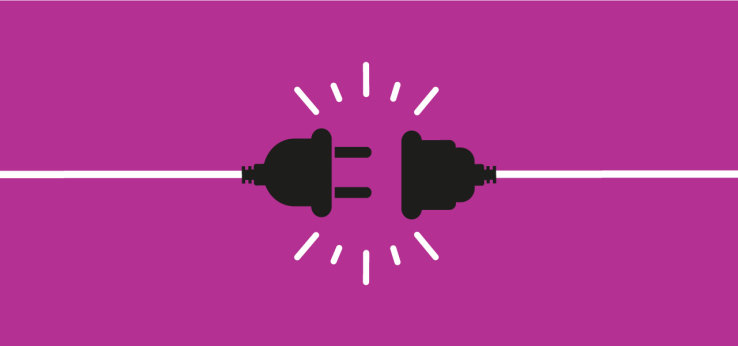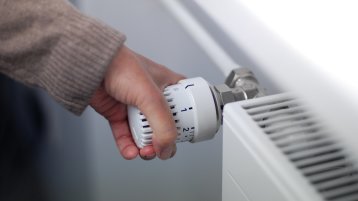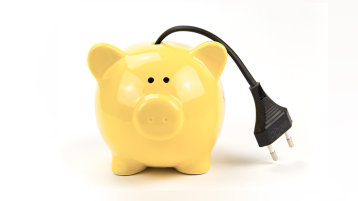Saving energy together
The state government of North Rhine-Westphalia called for energy savings due to the energy supply crisis in Europe. TH Köln responded to this call and was able to save 20 per cent of thermal energy. The university would like to continue this success for reasons of climate protection and to ensure a secure energy supply. Members of the university are therefore asked to continue saving energy.
Frequently asked questions about energy saving measures at TH Köln
Who can I contact if my room is too cold (or too warm)?
Please contact energiesparen@th-koeln.de
In many buildings, the heating system is unfortunately not modern enough to log all room temperatures, let alone regulate them. Therefore, we depend on your feedback in our efforts to save energy on the one hand and to set an acceptable room temperature on the other.
Halls are not supposed to be heated, why are individual radiators still warm?
The radiators are gradually turned off manually. If you find that a radiator has been missed, the control room (extension -2004) will be happy to hear from you. Some radiators must remain in operation to maintain circulation.
Are electric heaters allowed?
Generally not. In consultation with Team 10.3, different arrangements can be made, e.g. if otherwise a temperature of 20 degrees cannot be achieved in the office. Please contact energiesparen@th-koeln.de
My radiators are blocked. Who can help me?
TH Köln employees should contact the facility managers if furniture needs to be moved.
Do the measures also apply at the Gummersbach campus? The buildings have wood chip heating, i.e. no fossil fuels.
Saving any form of energy relaxes the market. In addition, it supports the necessary change toward climate protection and sustainability. Renewable resources also only grow back to a limited extent. The Gummersbach campus operates a gas heating system in addition to the wood chip heating system, the use of which is to be reduced. Last but not least, the energy crisis has also led to an price increase on the electricity, gas and wood market. Here, too, the university is required to keep cost increases as low as possible
Water
Is washing your hands and washing dishes with cold water hygienic?
Yes. The hygiene comes from the soap, which you should use especially considering the ongoing pandemic when washing hands. This also applies to washing dishes: It’s still hygienic if you use cold water and detergent.
Electronics & Lighting
Can I get socket strips that can be switched off?
Yes. Please write an email to energiesparen@th-koeln.de.
Should I pull all the plugs in my office in the evening?
Reducing standby losses is generally a good idea.
Are there other systems that can be switched off centrally?
Heating and cooling ventilation systems with high energy requirements are centrally controlled. Measures introduced to save energy include enabling ventilation only according to actual demand, increasing the cooling temperature in summer, shortening heating times when creating heat islands (libraries) in winter.
Outlook & future prospects
Are sustainable energy concepts being implemented in the new construction projects (Leverkusen, Deutz, Erftstadt)?
Yes. In Leverkusen, heating and cooling are obtained from an efficient local heat supply and cooling system. The energy concept for the Deutz Campus has not yet been finalized; a geothermal heat solution is currently being considered. Plans for the Erftstadt campus will be made accordingly in due course.
What other measures is TH Köln planning?
There is a growing list of projects supported by BLB, the owner of the buildings, e.g.
- Replacing of outdated pumps,
- Ventilation only according to actual demand,
- Increasing the cooling temperature in summer,
- Reducing heating times in winter while creating heat islands (libraries) in winter.
- Gradually replacing old lights with LEDs.
TH Köln has been running on green power since the beginning of 2022. Presence detectors and timers will be used for lighting in suitable places. Energy monitoring is being expanded. Night and weekend temperature reduction is already being implemented to the greatest possible extent.
Tips for saving energy
Electricity
- Do not leave devices running in standby mode
- Monitor: Switch off screen saver, switch on economy function
- PC: It is worth switching off after 5 minutes of idle time
- Laboratory equipment: Only switch on during experiments
- Copier: Press the economy button after copying, switch off completely at the end of the day/weekend
- Coffee machine: switch off after use - use thermos flask instead of hot plate
- Kettle: measure water accurately to avoid excess hot water
- Turn off lights when leaving the room, leave hallway lights on only when necessary.
Heating
- Turn down heating, especially during longer absences (where possible)
- Do not block radiators – free heat radiation and air circulation are necessary.
- Impact ventilation instead of tilting the window open: Preferably 3 times a day for 3 to 5 minutes. Turn off the heating if possible.
Did you know?
- Cell phone chargers draw electricity even when the phone is not connected.
- A single Google search causes between 0.2 and 7 grams of carbon dioxide emissions - 7 grams is roughly equivalent to a car journey of 15 meters. That's because each time a search is entered, several servers pass the information back and forth. The Ecosia search engine offsets emissions by planting trees.
- E-mails sent to multiple contacts or containing large amounts of data can generate up to 50 grams of carbon dioxide.
- A full inbox, a crowded spam box and newsletters increase energy consumption. The browser also offers savings potential: regularly delete the search history and empty the cache!



